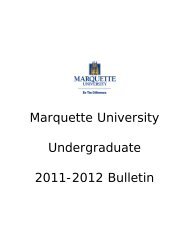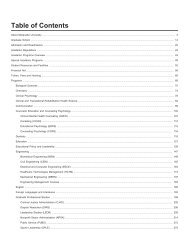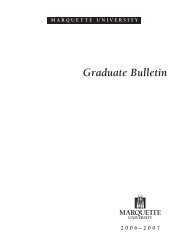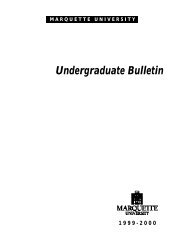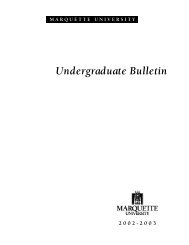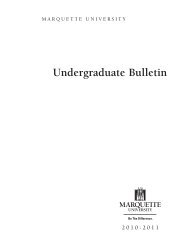2012-2013 - Marquette University Bulletin
2012-2013 - Marquette University Bulletin
2012-2013 - Marquette University Bulletin
You also want an ePaper? Increase the reach of your titles
YUMPU automatically turns print PDFs into web optimized ePapers that Google loves.
<strong>Marquette</strong> <strong>University</strong> - Graduate School of Management <strong>Bulletin</strong> 27<br />
4. Taking an examination for another student or having someone take an examination for oneself.<br />
5. Sharing answers for a take home examination or assignment unless specifically authorized by the instructor.<br />
6. Tampering with an examination after it has been corrected, and then returning it for more credit.<br />
7. Using unauthorized materials during an examination.<br />
8. Allowing others to do the research and writing of an assigned paper (including use of the services of a commercial term paper<br />
company).<br />
Dishonest Conduct<br />
1. Stealing or attempting to steal an examination or answer key from the instructor.<br />
2. Changing or attempting to change academic records without proper sanction.<br />
3. Submitting substantial portions of the same work for credit in more than one course without consulting all instructors involved.<br />
4. Intentionally disrupting the educational process in any manner.<br />
5. Allowing another student to copy off one’s own work during a test.<br />
Plagiarism<br />
Plagiarism is intellectual theft. It means use of the intellectual creations of another without proper attribution. Plagiarism may take two main<br />
forms, which are clearly related: 1. To steal or pass off as one’s own the ideas or words, images, or other creative works of another and 2.To<br />
use a creative production without crediting the source, even if only minimal information is available to identify it for citation.<br />
Credit must be given for every direct quotation, for paraphrasing or summarizing a work (in whole, or in part, in one’s own words) and for<br />
information that is not common knowledge.<br />
Collusion<br />
Any student who knowingly or intentionally helps another student perform any of the above acts of cheating, dishonest conduct or plagiarism<br />
is subject to discipline for academic dishonesty.<br />
Research Misconduct<br />
<strong>Marquette</strong> <strong>University</strong> has a duty to ensure the integrity of research and will respond to any allegation of research misconduct in a<br />
thorough, competent, timely, objective and fair manner. Research misconduct is defined as fabrication, falsification, or plagiarism in<br />
proposing, performing, or reviewing research, or in reporting research results. The research misconduct policy applies to faculty, students<br />
and others who are employed by or affiliated with <strong>Marquette</strong> <strong>University</strong>. Students who are accused of misconduct related to grantfunded<br />
research shall be governed by the procedures of the research misconduct policy (http://www.marquette.edu/orsp/documents/<br />
ResearchMisconductPolicy1_09.pdf). Students who are accused of misconduct related to research that is not grant-funded and is a part<br />
of a student’s academic program will be governed by the <strong>University</strong> Policy on Academic Honesty, found at marquette.edu/mucentral Any<br />
uncertainty related to which policy will govern a given situations will be decided by the research integrity officer.<br />
Consequences of Academic Dishonesty<br />
Regardless of how alleged acts of academic dishonesty are brought to light, faculty and instructors retain the responsibility and the<br />
authority to investigate all allegations, although, as outlined below, university administrators may lead these investigations. Because the<br />
consequences for academic dishonesty can be severe, the decision to penalize a student for such infractions must be the result of a<br />
thorough review. The procedures to be used for adjudicating suspected acts of academic dishonesty are determined by the nature of the<br />
misconduct and the seriousness of the offense.<br />
Procedures for Incidents of Academic Dishonesty<br />
Students found committing acts of academic dishonesty will be subject to the <strong>Marquette</strong> <strong>University</strong> procedures for incidents of academic<br />
dishonesty. In what follows the wording “chair” refers to either a department chair or an equivalent official, “associate dean” refers to either<br />
an associate dean or an equivalent official, or in the case of the Graduate School of Management it shall refer to the executive associate<br />
dean, the word “college” refers to a college, school, or other academic unit, and the words “assigned college” refers to the college granting<br />
the degree (i.e. for graduate students the assigned college is the Graduate School of Management).<br />
First Offenses<br />
Many, perhaps most, incidents of academic dishonesty involve accusations which are based on clear evidence and which are not contested<br />
by the accused student. In such cases, if the infraction is relatively minor and there is no indication that the accused student has previously<br />
been involved in such incidents, it is most appropriate that the matter be resolved between the student, the faculty member, and the chair of<br />
the department offering the course.<br />
When a faculty member has evidence of a student’s academic dishonesty, the faculty member must initiate communication with the student<br />
within 15 calendar days of discovering evidence of academic dishonesty. The faculty member must then present the evidence to the student<br />
in a private meeting, always with a facilitator present (e.g., department chair or designee). This meeting should take place within 15 calendar



